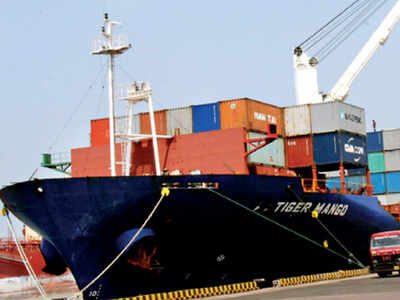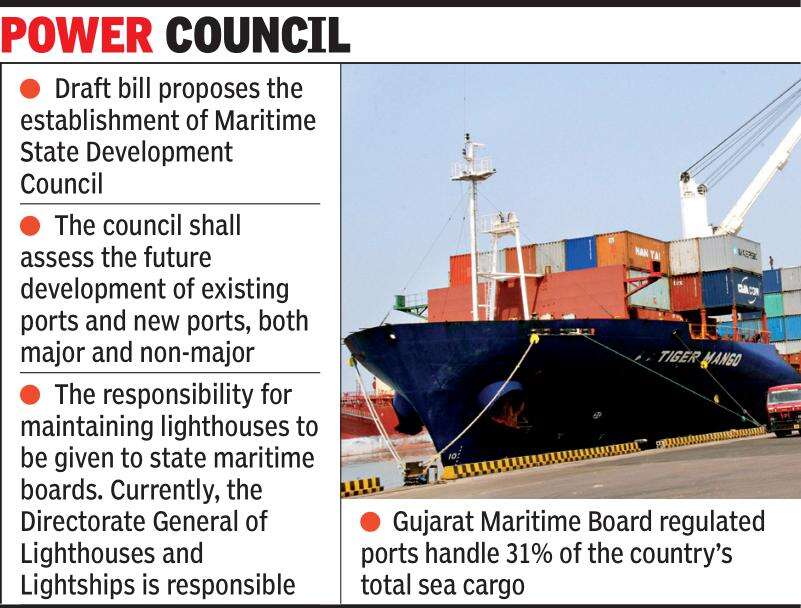- News
- City News
- ahmedabad News
- Gujarat faces Draft Ports Bill challenge

Gujarat Maritime Board regulated ports handle 31% of the country’s total sea cargo
AHMEDABAD: The Gujarat government recently announced plans to invite global bids to develop a non-major port at Nargol with an initial investment of Rs 3,800 crore. Less than 50km away at Vadhavan in Maharashtra, the central government is working on a plan to develop a major port for an estimated investment of Rs 65,000 crore.
Nargol is likely to encounter tough competition from Vadhavan in drawing traffic. Moreover, the plans to develop new ports and to boost port-led development activities could face challenges if the Draft Ports Bill 2021 of the Union ministry of ports, shipping and waterways is implemented in its present form.
 The draft bill aims to modify the current management model of non-major ports or ports that are run by state maritime regulators. The major ports are run by the central government.
The draft bill aims to modify the current management model of non-major ports or ports that are run by state maritime regulators. The major ports are run by the central government.
“The powers of state maritime boards are likely to get affected as the policy proposes setting up of Maritime State Development Council (MSDC) where any plan for developing a new port is to be cleared,” said a state government official.
He said that the council will have ministers of ports and shipping from every state as representatives, with the Union minister of ports being the chairperson.
“This issue faced by Nargol and Vadhavan is common in many parts of the country today,” said Anand Sharma, director of Mantrana Maritime Advisory Private Limited. “And the draft bill, if it were to become a reality, will only create more jurisdictional issues.” Sharma went on to say: “The bill asks the states to set up maritime boards for planning infrastructure and mandates them to act independently.”
Sharma added: “However, it vests the approval of any infrastructure planned by the state on the council.”
The majority of the 27 functions defined for MSDC override the independence of state maritime boards, Sharma said.
The council has powers to withdraw, suspend, or cancel port registrations without defining the parameters, he further said.
MSDC can also advise maritime boards on concession agreements and areas such as competition and anti-competition.
An official with the Union ministry of ports said that MSDC will formulate a national plan for major and non-major ports of India, for both existing and proposed.
“There are more than 200 minor ports in the country of which there would be barely 50 that are fully operational,” he said. “We need to revive these ports and chalk out a national plan covering all states.”
Tamil Nadu chief minister recently wrote to his counterparts in nine states, including Gujarat, proposing that all coastal states and Union Territories object to the bill as it dilutes the powers vested with the states.
Gujarat Maritime Board regulated ports handled 338 million metric tonnes (MMT) of cargo for the year 2020-21 as compared to the total national cargo of 1,247MMT. The state houses the country’s largest commercial port, the largest captive jetty, and is the only state to have three LNG terminals.
“Gujarat handles about 31% of the country’s total sea cargo and it is likely to be adversely impacted due to the new policy proposed,” said another state government official.
“If there is a central council to decide whether a state can develop a greenfield port or where it can be developed, if an existing port can be expanded or not, then the role of a state maritime regulator is diluted.”
Nargol is likely to encounter tough competition from Vadhavan in drawing traffic. Moreover, the plans to develop new ports and to boost port-led development activities could face challenges if the Draft Ports Bill 2021 of the Union ministry of ports, shipping and waterways is implemented in its present form.

“The powers of state maritime boards are likely to get affected as the policy proposes setting up of Maritime State Development Council (MSDC) where any plan for developing a new port is to be cleared,” said a state government official.
He said that the council will have ministers of ports and shipping from every state as representatives, with the Union minister of ports being the chairperson.
“This issue faced by Nargol and Vadhavan is common in many parts of the country today,” said Anand Sharma, director of Mantrana Maritime Advisory Private Limited. “And the draft bill, if it were to become a reality, will only create more jurisdictional issues.” Sharma went on to say: “The bill asks the states to set up maritime boards for planning infrastructure and mandates them to act independently.”
Sharma added: “However, it vests the approval of any infrastructure planned by the state on the council.”
The majority of the 27 functions defined for MSDC override the independence of state maritime boards, Sharma said.
The council has powers to withdraw, suspend, or cancel port registrations without defining the parameters, he further said.
MSDC can also advise maritime boards on concession agreements and areas such as competition and anti-competition.
An official with the Union ministry of ports said that MSDC will formulate a national plan for major and non-major ports of India, for both existing and proposed.
“There are more than 200 minor ports in the country of which there would be barely 50 that are fully operational,” he said. “We need to revive these ports and chalk out a national plan covering all states.”
Tamil Nadu chief minister recently wrote to his counterparts in nine states, including Gujarat, proposing that all coastal states and Union Territories object to the bill as it dilutes the powers vested with the states.
Gujarat Maritime Board regulated ports handled 338 million metric tonnes (MMT) of cargo for the year 2020-21 as compared to the total national cargo of 1,247MMT. The state houses the country’s largest commercial port, the largest captive jetty, and is the only state to have three LNG terminals.
“Gujarat handles about 31% of the country’s total sea cargo and it is likely to be adversely impacted due to the new policy proposed,” said another state government official.
“If there is a central council to decide whether a state can develop a greenfield port or where it can be developed, if an existing port can be expanded or not, then the role of a state maritime regulator is diluted.”
FacebookTwitterLinkedinEMail
Start a Conversation
end of article
Quick Links
Delhi Air PollutionDelhi TemperatureChennai WeatherBangalore TemperatureCovid vaccination centres in DelhiCoronavirus in DelhiRTPCR test in GurgaonHyderabad RainPollution level in BangaloreDelhi SmogDelhi TemperatureNoida AQIGurgaon AQI todayFire in MumbaiMumbai RainsCovid 19 RT PCR Test in NoidaDelhi AQI todaySrinagar encounter
